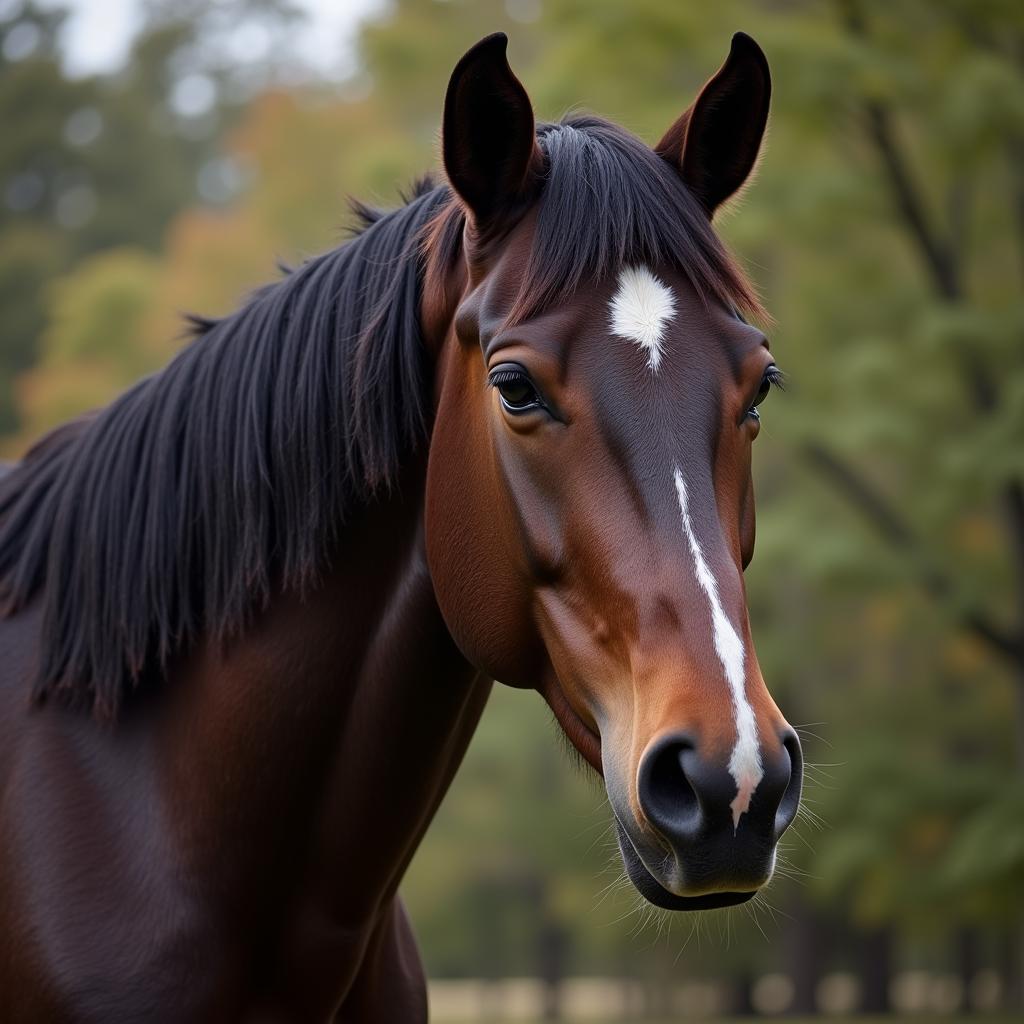Walking Horse Stallions are prized for their smooth gaits, stunning presence, and rich history. This guide delves into the world of these magnificent creatures, covering everything from their unique characteristics to responsible ownership and breeding practices.  Portrait of a Majestic Walking Horse Stallion
Portrait of a Majestic Walking Horse Stallion
Understanding the Walking Horse Stallion
The Tennessee Walking Horse, known for its distinctive running walk, is a breed where stallions often take center stage. Their impressive size, combined with their natural grace and four-beat gait, makes them a popular choice for showing, breeding, and pleasure riding. But what sets these stallions apart?
Characteristics and Temperament
Walking horse stallions typically stand between 15 and 17 hands high, with a muscular build and a refined head. Their coat can vary in color, from the classic black and bay to more unique shades like palomino and roan. While their temperament can be spirited, they are generally known for their intelligence and trainability. Proper handling and socialization from a young age are crucial for developing a well-mannered stallion.
The Importance of Bloodlines
When considering walking horse stallions, bloodlines play a significant role. Reputable breeders focus on preserving and enhancing desirable traits, such as the smooth running walk and a calm temperament. Researching a stallion’s pedigree can provide valuable insights into its potential for performance, conformation, and temperament.
“A stallion’s lineage is a blueprint of its potential,” says renowned equine expert Dr. Amelia Hartwell. “Understanding the strengths and weaknesses of a stallion’s ancestors can guide breeding decisions and predict the qualities of future offspring.”
Caring for Your Walking Horse Stallion
Owning a walking horse stallion is a rewarding but demanding endeavor. These animals require specialized care and management to ensure their well-being and safety.
Housing and Nutrition
Stallions require secure and spacious housing, preferably with separate paddocks or pastures to minimize the risk of injury from interactions with other horses. Their diet should be tailored to their individual needs, considering factors such as age, activity level, and breeding status. High-quality hay, grain, and supplements can help maintain optimal health and performance.
Handling and Training
Working with a stallion requires experience and a firm but fair approach. Consistent training and clear communication are essential for establishing respect and control. Groundwork exercises, such as leading, lunging, and desensitization, can build a solid foundation for ridden work. It’s crucial to work with a qualified trainer experienced with stallions to ensure both horse and handler safety.
“Patience and consistency are key when training a stallion,” advises experienced horse trainer John Riley. “Building a strong bond based on trust and mutual respect is essential for a successful partnership.”
Breeding Walking Horse Stallions
Breeding walking horse stallions is a complex process that requires careful planning and consideration. Selecting the right mare and ensuring the health of both animals are crucial for producing healthy and desirable offspring.
Selecting a Mare
The mare’s conformation, temperament, and bloodlines should complement those of the stallion. A thorough veterinary examination is essential to ensure the mare is free from any reproductive issues.
Breeding Methods
Various breeding methods, including live cover, artificial insemination, and embryo transfer, can be used depending on the circumstances and the breeder’s preferences. Each method has its advantages and disadvantages, and consulting with a veterinarian or breeding specialist is recommended.
Finding the Right Walking Horse Stallion
Whether you’re looking for a gelding horse for sale or a sticker horse, finding the right walking horse stallion requires careful research and consideration.
Reputable Breeders
Working with a reputable breeder is essential. Reputable breeders prioritize the health and well-being of their horses, adhere to ethical breeding practices, and can provide valuable information about a stallion’s lineage and temperament.
Evaluating Conformation and Gait
Carefully evaluate the stallion’s conformation and gait. Look for a well-balanced build, smooth gaits, and correct leg movement.
Conclusion
Walking horse stallions are magnificent animals that embody power, grace, and a rich equestrian heritage. Understanding their unique characteristics, providing proper care, and making informed breeding decisions are essential for preserving and celebrating this remarkable breed. Responsible ownership and a commitment to the well-being of these animals are paramount to ensuring their continued success and enjoyment for generations to come.
FAQ
- What is the average lifespan of a walking horse stallion? (A walking horse stallion typically lives between 25 and 30 years.)
- How much space does a walking horse stallion need? (A stallion requires ample space, with a minimum of one acre per horse recommended.)
- What are the common health concerns for walking horse stallions? (Common health concerns include laminitis, colic, and respiratory issues.)
- What is the best way to handle a walking horse stallion? (Consistent training, clear communication, and a firm but fair approach are essential.)
- How much does it cost to maintain a walking horse stallion? (The cost of maintaining a stallion can vary depending on factors such as location, boarding arrangements, and veterinary care.)
- Where can I find reputable breeders of walking horse stallions? (Reputable breeders can be found through breed associations, online directories, and referrals from experienced horse owners.)
- What is the history of the Tennessee Walking Horse breed? (The Tennessee Walking Horse breed originated in the southern United States in the late 18th century, developed from a mix of gaited breeds.)
Need more assistance? Contact us at Phone: 0772127271, Email: [email protected] or visit our address at QGM2+WX2, Vị Trung, Vị Thuỷ, Hậu Giang, Việt Nam. We have a 24/7 customer service team.